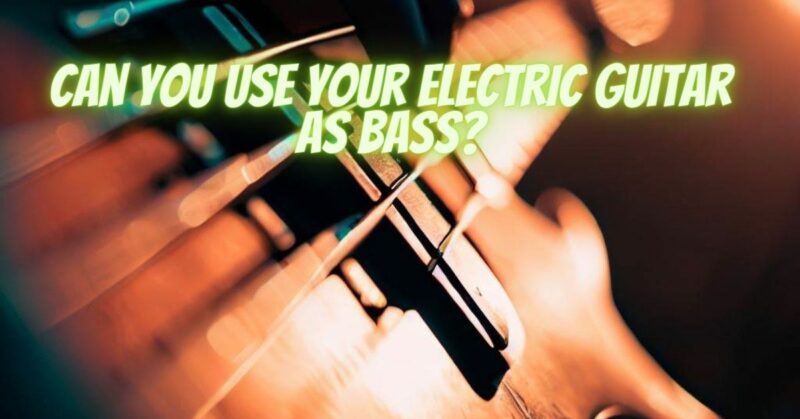Electric guitars and bass guitars are two distinct instruments with unique roles in the realm of music. However, curiosity often arises about the interchangeability of these instruments, particularly whether an electric guitar can be used as a bass in certain situations. In this article, we’ll delve into the considerations and implications of using your electric guitar as a bass.
Understanding the Differences:
Electric guitars and bass guitars have fundamental differences that extend beyond their appearance:
- Range and Tuning: Bass guitars typically have fewer strings and a longer scale length, allowing them to produce lower frequencies. The standard tuning for a bass guitar is an octave lower than the lower four strings of a guitar.
- String Gauges: Bass guitar strings are thicker and heavier to accommodate the lower tuning and produce the desired low frequencies.
- Sound and Role: Bass guitars provide the foundation of rhythm and harmony in a band, anchoring the music with low-end frequencies. Electric guitars focus on melodies, harmonies, and solos, adding texture and lead elements to the music.
Can You Use an Electric Guitar as a Bass?
While it is technically possible to use an electric guitar as a bass in certain situations, there are important considerations to keep in mind:
- Tuning and String Gauges: To simulate a bass sound on an electric guitar, you would need to tune down the strings significantly and potentially use heavier gauge strings. However, this can put strain on the guitar’s neck and potentially cause damage over time.
- Sound Limitations: The inherent tonal characteristics of an electric guitar’s pickups, strings, and body construction are different from those of a bass. As a result, using an electric guitar as a bass may result in a sound that lacks the depth, richness, and low-end impact expected from a bass guitar.
- Playing Technique: The playing technique for bass guitar is distinct from that of electric guitar. Bass guitarists often use techniques such as fingerstyle or slap and pop to create the desired low-end grooves and rhythms. Transferring these techniques to an electric guitar may not yield the same results.
- Role in a Band Setting: In a band context, the bass guitar serves a critical role in providing the foundation and rhythm for the music. Using an electric guitar as a bass might not fulfill this role effectively, potentially affecting the overall sound of the band.
While experimentation in music is encouraged and can lead to creative breakthroughs, using an electric guitar as a bass is not a straightforward endeavor. The differences in tuning, string gauges, tonal characteristics, and playing technique make it challenging to achieve an authentic bass sound and fulfill the bass guitar’s role in music. If you’re interested in exploring bass frequencies or expanding your musical horizons, consider investing in a dedicated bass guitar. This will provide you with the optimal tools to create powerful, resonant basslines and contribute to the richness and depth of your musical endeavors.


